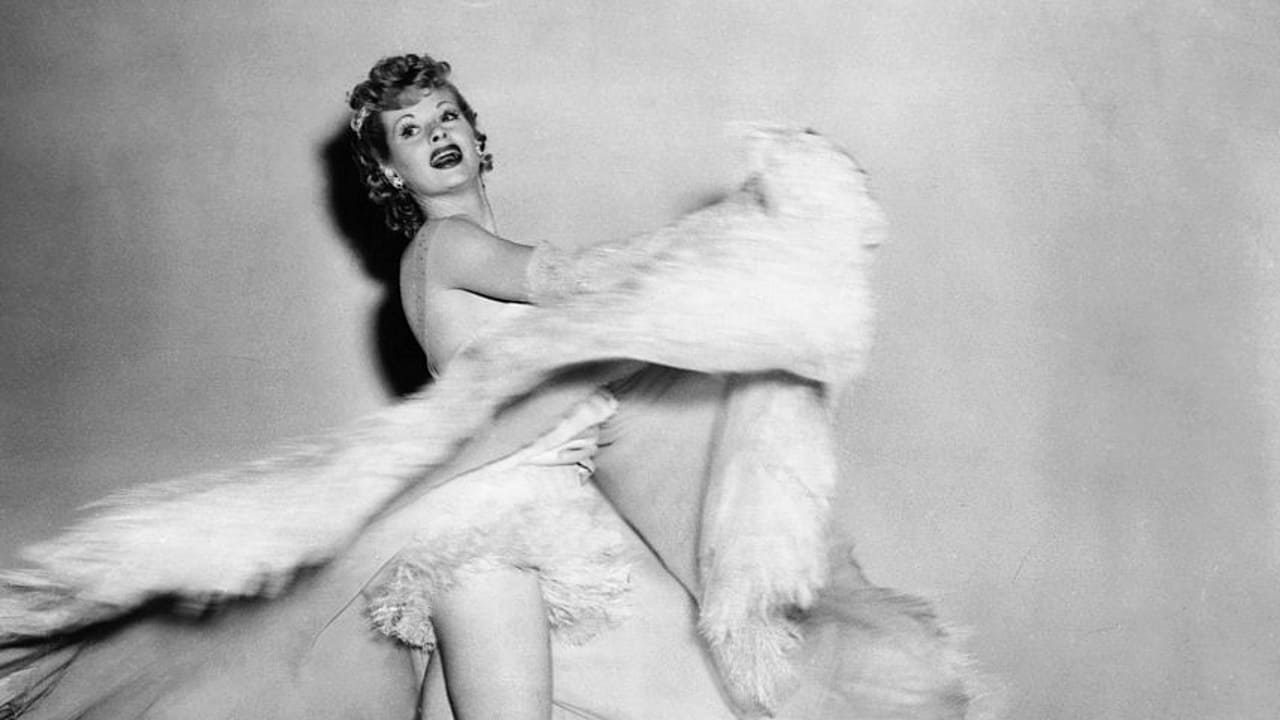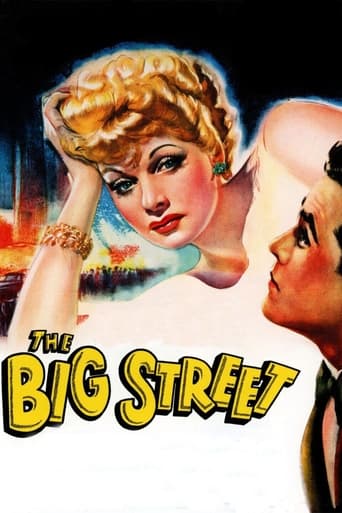

Perfectly adorable
... View MoreAn absolute waste of money
... View MoreAbsolutely brilliant
... View MoreIn truth, there is barely enough story here to make a film.
... View MoreThis is a double tragedy. Having just watched "Dance, Girl, Dance", also released by RKO, 2 years before, I couldn't help noticing that both films were dramas, featuring the romantic designs of a superaggressive, heartless, gold digging, Broadway club entertainer or burlesque queen, played by Lucille Ball. The main difference is that ,in the present film, Lucy's character(Gloria) is the only significant female character, whereas in "Dance, Girl, Dance", she shares the spotlight with Maureen O'Hara in a good/bad girl competition and cooperation. Also, in that film, they compete for a wealthy patron, whereas in the present film, it's the men who initially compete for Gloria's romantic attention.Rather early in the film, Gloria is rendered a cripple by falling backwards down a flight of stairs after a push from her jealous gangster boyfriend and employer, after learning that she plans to marry wealthy playboy Decatur Reed. Thereafter, the powerful men in her life ignore her. Her only consistent friend is an overaged bus boy: Little Pink(Henry Fonda). Despite all the things he does for her to make her life bearable, she usually treats him like trash. Nonetheless, he continues to address her as "Your Highness", denoting his continued respect. He even lets her sleep in his low class basement apartment. Perhaps the most implausible aspect of the screenplay is that Little Pink supposedly somehow gets her with her wheelchair from NYC to a plush seaside resort in Florida, without money for public transport. Several instances of hitchhiking are shown, along with periodic shots of Little Pink pushing Gloria along a highway. No word on how they managed to live and sleep during this marathon!?When it becomes evident that Gloria will likely never walk again, she goes into a greater depression and seemingly wills a gradual degeneration of her body. Gloria tells Little Pink she has a wish before she dies that she is dressed in a fancy expensive dress and expensive jewelry, and can look over the ocean. Well, there's no money forthcoming to fulfil this request. So, crazy Little Pink breaks into a house and steals the items Gloria requested. She wears the items to a party in a restaurant, apparently not questioning where Little Pink got them. When Gloria finds out that Little Pink stole the items she is wearing, and that the police are on their way to arrest Little Pink for grand larceny, she softens her attitude toward him. Little Pink asks her to dance with him. She doesn't think she can, but he holds her up initially, then lets go of her, and she stands. She is elated. I will leave you to see the conclusion of this film.Lucy showed that she could do convincing tragic drama, playing an unsympathetic character. Fonda was also excellent in his unusual role as a crazy young man, including dashing into NYC traffic to save Gloria's Pekingese. However, he seemed too old and sophisticated to be a busboy. Supporting actors included some familiar faces: Eugene Palette, Agnes Morehead, Ray Collins, George Cleveland, Louise Beavers, and Ozzie Nelson's band.
... View MoreTo laugh at Lucy is not to know her as a dramatic actress, and in this Damon Runyeon drama, she is at her dramatic, bitchiest best. The wise-cracking girl of "Stage Door" (1937) has grown up, and here she is a gangster's moll nightclub singer. Busboy Henry Fonda is enamored of her to the point where he refers to her as "Your Highness", a nickname Lucy's maid Louise Beavers goes mad over. "Coming, Your Highness!" she responds to Ball's "Hey Ruby, move your big fat feet!", Beavers adding on that boisterous laugh that jolts her own heart full of gold. But to Lucy, Fonda's "Little Pinks" has a heart full of mush, something she'll need when her "daddy" (Barton MacLane) pushes her down a flight of stairs after she threatens to leave him and blames it on the fact that she was drunk. Her Broadway pals all disappear on her with the exception of Fonda and Beavers. Broke and desperate, Ball moves in to Fonda's small apartment, continues to abuse him, and lives off the champagne and caviar that he scrapes together nightly so she can continue to live in her dream world. Her desire is to go to Florida so she can see the man she really loves (William T. Orr), a socialite bore not worthy of her time. Fonda quits his job and pushes her there in her wheel chair, where his pals Violet (Agnes Moorehead) and Nicely Nicely Johnson (Eugene Palette) have opened a ocean front burger dive. It is there that Ball learns the true meaning of total unselfishness, something she had earlier been ignoring in her own spirit.Yes, the idea of Henry Fonda pushing Lucille Ball from New York to Florida in a wheelchair might sound absurd, but somehow, the movie pulls it off. To see Lucy playing such a hard character might be difficult for her comedy fans to accept. More than 20 years after her death, Lucy still reigns as TV's top female clown. But before that, she had a very versatile movie career, singing and dancing in "Best Foot Forward" and "DuBarry Was a Lady", and clowning around Lucy Ricardo style in "Her Husband's Affairs" and "The Fuller Brush Girl". This is Lucy at her cinematic best. Henry Fonda seems a bit out of sorts as the busboy whose unrequited love for her goes unnoticed. Two years after his dramatic triumph in "The Grapes of Wrath", this is almost a step down for him, but he does so with noble results. And that supporting cast. Wow. Agnes Moorehead goes from the shy Violet who replaces Eugene Palette in an eating contest to his nagging wife, and is very funny. Palette is adorable here, playing Nicely Nicely much different than Stubby Kaye would later do on Broadway and in the film version of "Guys and Dolls". MacLane is appropriately mean, Beavers loving, and Ray Collins the Greek Chorus of the plot. Add on Marion Martin as a Florida socalite and Sam Levene, who would be Nathan Detroit 8 years later when "Guys and Dolls" made it to Broadway. All in all, this is a film that can't be skipped.
... View More"The Big Street" was not a major hit when first released but the critics at the time all noted Lucille Ball's superb star-making performance as one of the all-time nastiest women ever to reach the big screen. Lucy was already a minor star thanks to a string of popular B-grade comedies and dramas but this film cemented her stardom and brought her to MGM where she reached an early peak the next year. The film is sentimental and does have some plot points that have to be swallowed but Ball's great acting and chemistry with a splendid Fonda makes this tale of unrequited love work. Fonda plays a kind innocent busboy who falls madly in-love with a crippled chanteuse(Ball). The last scene on the dance floor is unforgettable. Why RKO did not get Lucy an Oscar nomination for this performance is a crime. All the critics at the time hailed her work in this but it just slipped under the rug when the film posted only small profits. This was the kind of role Bette Davis made her own but Ball does it without Davis' habit of falling into mannerisms. Agnes Moorehead is also excellent as Fonda's concerned friend. Beautiful cinematography makes Ball look incredible in her close-ups. Worth a look but overlook the occasional mawkish elements. Lucy makes it a must.
... View MoreI found this film to be highly disappointing, basically I would only recommend it to Lucille Ball fans. Henry Fonda plays a guy who thinks that a selfish arrogant nightclub singer (Ball) is a goddess. He even calls her "Your Majesty". At the end of the film we're supposed to believe that Ball's character has changed her ways, magically, upon realizing that Fonda is in love with her -- somehow she didn't notice while he was wheeling her in a wheelchair from New York to Florida. The film's only real redeeming quality is the good character performances from Fonda's friends, who spout Damon Runyan dialogue with appropriate panache and rough grace. This film attempts to mix drama and comedy but fails to achieve either with anything but sporadic success.
... View More